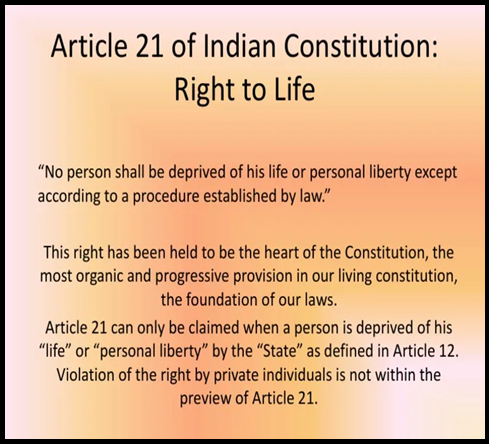“BNSS EXTENDS POLICE CUSTODY, VIOLATES ARTICLE 21 RIGHTS”
Why in the news?
BNSS extends police custody limits, raising concerns about violating Article 21’s protections against torture and excessive detention of undertrials.
 source:wordpress
source:wordpress
BNSS and Extended Police Custody: Violating Article 21
- Issue: BNSS extends police custody, violating Article 21’s protection of undertrials.
CrPC’s Safeguards:
- Police vs. Judicial Custody: Police custody is harsher.
- Current Limits: CrPC caps police custody at 15 days within a 60-90 day period.
- BNSS Changes: Removes the 15-day cap, allowing longer police custody.
Implications of BNSS:
- Section 187 (3): Magistrates can authorise extended police custody beyond 15 days, up to 90 days for severe crimes.
- Comparison: Even UAPA limits police custody to 30 days with stringent requirements.
Constitutional Concerns:
- Article 21 Violations: Extended police custody threatens rights to life, health, and fair trial.
- Supreme Court Ruling: Article 21 guarantees dignity and protection against torture for all detainees.
About Bhartiya Nagrik Suraksha Sanhita (BNSS):
- Replaces: Code of Criminal Procedure (Cr.PC), 1973.
- Updates IPC: Includes potential sections on crimes against men and transgender persons.
Key Provisions:
- Arrest, Bail, Custody: New procedures outlined.
- Cognisable Offences: Registered under Section 173 of BNSS.
- State Amendments: States can amend provisions.
- Electronic FIRs: Upgraded CCTNS supports e-FIRs and zero FIRs.
- Language Support: FIRs in multiple languages beyond English and Hindi.
About section 187 of BNSS:
- BNSS Section 187: Replaces CrPC.
- Police Custody: 15 days can be authorised in parts during initial 40/60 days of judicial custody.
- Duration: 60 days for serious offences, 40 days otherwise.
Section 167 CrPC:
- Purpose: Governs police investigation and custody of accused.
- Timeline: Accused must be presented before a magistrate within 24 hours.
- Custody: Magistrate can authorise police or judicial custody, up to 15 days.
- Default Bail: If no substantial evidence is gathered, the accused may be released on default bail.
- Rights Protection: Ensures the fundamental right to personal liberty and prevents excessive detention.
Section 167(2) Crpc:
- Magistrate authorises up to 15 days of police custody.
- If lacking jurisdiction, the case is forwarded to a higher-ranking magistrate.
- Ensures limited and appropriate detention.
Associated Article
https://universalinstitutions.com/new-criminal-law-bills/#:~:text=The%20New%20Bills%3A,Indian%20Evidence%20Act%2C%201872) |
source:wordpress




